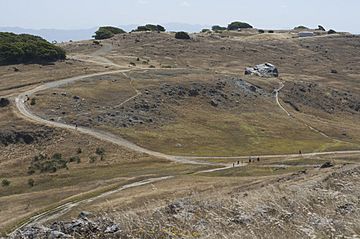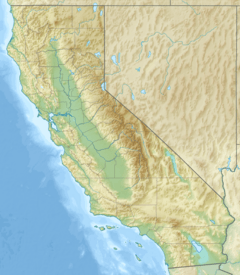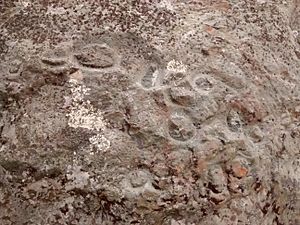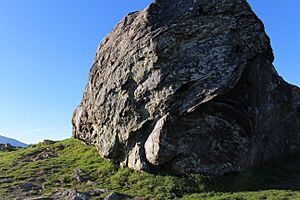Ring Mountain (California) facts for kids
Quick facts for kids Ring Mountain |
|
|---|---|
 |
|
| Highest point | |
| Elevation | 603 ft (184 m) NAVD 88 |
| Prominence | 402 ft (123 m) |
| Geography | |
| Location | Marin County, California, U.S. |
| Topo map | USGS San Quentin |
Ring Mountain is a special hill on the Tiburon Peninsula in Marin County, California. It was named after George E. Ring, who was a local leader from 1895 to 1903.
This mountain is home to many rare and endangered plants. Its two tops are made of a rock called serpentinite. This rock has a lot of magnesium, which creates unusual soil. You can also find many large rocks scattered around. These rocks show different types of rock formations, including special ones like amphibolite and blueschist.
Ancient Coast Miwok people also left their mark here. You can find pecked curvilinear nucleated petroglyphs, which are carvings made on rocks.
Contents
What Makes Ring Mountain's Geology Unique?
Ring Mountain is a fascinating place for studying rocks. Here, you can see rocks that formed in ancient subduction zones. A subduction zone is where one of Earth's huge plates slides under another.
How Did the Rocks Form?
The mountain's two peaks are made of a rock called serpentinite. The steep upper parts of the mountain have a mix of rocks called a serpentinite-matrix mélange. This mélange contains large pieces of rock that changed under high pressure and heat. These changes happened deep inside the Earth in subduction zones.
The rocks here are special because of their size and variety. Scientists have studied these rocks and found that they formed over a very long time, starting about 175 million years ago. These rocks show different stages of change, including greenschist, blueschist, and amphibolite. Ring Mountain is also where a mineral called Lawsonite was first identified.
The lower parts of the mountain have different rocks, like sandstone and shale. However, the exact spot where these rocks meet the serpentinite mélange is hidden. Landslides are common on Ring Mountain. They move serpentinite and other rock pieces far down the slopes.
How Did the Mélange Form?
Scientists have different ideas about how the serpentinite-matrix mélange formed. Some think that the changed rocks were brought to the surface, then eroded, and later redeposited into a subduction trench. Others believe the mélange formed directly in a subduction zone. Here, pieces of rock from the plate sliding down mixed with serpentine from the upper plate.
Ring Mountain is a featured location in an online guide for geological field trips. This guide was released by the American Geophysical Union in 2019.
Animal Life
Even though Ring Mountain is surrounded by a highway and towns, it's like an island for wildlife. Many animals live here, including coyotes, deer, and skunks. You can also spot many different birds and reptiles.
Plant Life
Ring Mountain is very important for plants. It is the only place in the world where the Tiburon mariposa lily grows. This beautiful flower can be found near the mountain's top in grassy areas.
Other rare plants also call Ring Mountain home. These include the Tiburon jewelflower and the Tiburon paintbrush. The Nature Conservancy bought land around the mountain to help protect these rare native plants.
Recreation
Ring Mountain is a popular spot for outdoor activities. People enjoy hiking and rock climbing here. From the mountain, you can see amazing 360-degree views of the northern San Francisco Bay Area.
 | Charles R. Drew |
 | Benjamin Banneker |
 | Jane C. Wright |
 | Roger Arliner Young |





